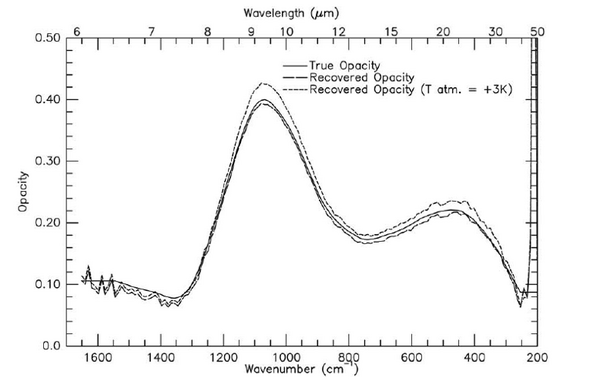Category:Atmospheric Properties
| (7 intermediate revisions by one user not shown) | |||
| Line 12: | Line 12: | ||
KRC assumes broadband atmospheric opacities, but the default values are given a specific wavelengths. | KRC assumes broadband atmospheric opacities, but the default values are given a specific wavelengths. | ||
| − | '''1.''' VIS/9μm dust opacity ratio is ~2:1 (M. Smith personal communication); | + | '''1.''' ''VIS/9μm dust opacity ratio is ~2:1'' (M. Smith personal communication); |
| − | '''2.''' 9μm to broadband TIR ratio is 2.5:1 (ratio of maximum and average values of the dust opacity spectrum from Bandfield and Smith, [2003], Figure 3); | + | '''2.''' ''9μm to broadband TIR ratio is 2.5:1'' (ratio of maximum and average values of the dust opacity spectrum from Bandfield and Smith, [2003], Figure 3); |
| + | [[Image:Atm_parameters_Change.png|600px|Figure 3 from Bandfield and Smith (2003)]] | ||
| + | Then: | ||
| + | TAURAT ≈ 0.22 (J. Bandfield personnal communication). | ||
| − | + | Values for DUSTA and ARC2 go together, and should not be changed without the other (see the table below). To stick with J. Bandfield’s values, a user can work with: | |
| − | + | DUSTA = 0.90 | |
| − | + | ||
| − | + | ||
| − | + | ARC2 = 0.50 | |
| − | + | Other values are acceptable, except for “KRC Default” (see Table below) | |
| − | + | [[Image:Atm_parameters.png|600px|]] | |
__________________________________ | __________________________________ | ||
Latest revision as of 13:08, 8 November 2016
[edit] Adjusting KRC's atmospheric Parameters
Several of KRC's default atmospheric parameters might not be optimized for most users:
TAURAT: Ratio of thermal to visible opacity of dust
DUSTA: Single scattering albedo of dust
ARC2: Henyey-Greenstein asymmetry factor
KRC assumes broadband atmospheric opacities, but the default values are given a specific wavelengths.
1. VIS/9μm dust opacity ratio is ~2:1 (M. Smith personal communication);
2. 9μm to broadband TIR ratio is 2.5:1 (ratio of maximum and average values of the dust opacity spectrum from Bandfield and Smith, [2003], Figure 3);
Then:
TAURAT ≈ 0.22 (J. Bandfield personnal communication).
Values for DUSTA and ARC2 go together, and should not be changed without the other (see the table below). To stick with J. Bandfield’s values, a user can work with:
DUSTA = 0.90
ARC2 = 0.50
Other values are acceptable, except for “KRC Default” (see Table below)
__________________________________
References
Bandfield, J. L., and M. D. Smith (2003), Multiple emission angle surface-atmosphere separations of Thermal Emission Spectrometer data, Icarus, 161, 47-65.
Kieffer, H. H. (2013), Thermal model for analysis of Mars infrared mapping, Journal of Geophysical Research: Planets, 118(3), 451-470.
Shaw, A., M. J. Wolff, F. P. Seelos, S. M. Wiseman, and S. Cull (2013), Surface scattering properties at the Opportunity Mars rover's traverse region measured by CRISM, Journal of Geophysical Research-Planets, 118(8), 1699-1717, doi:10.1002/jgre.20119.
This category currently contains no pages or media.

